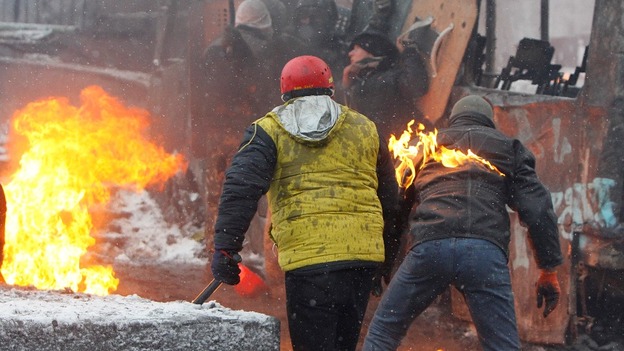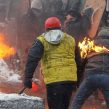
Tension in Ukraine Likely to Turn Into Civil Conflict
Publication: Eurasia Daily Monitor Volume: 11 Issue: 13
By:

A radical outburst of demonstrations on Hrushevskoho Street and European Square in Kyiv on January 22 resulted in the reported deaths of two protesters from rifle bullet wounds (https://www.unian.ua/politics/875144-pershi-jertvi-protistoyannya-troe-zagiblih-na-grushevskogo.html). The violence began on January 19 when a group of protesters attempted an assault on a police blockade in order to occupy the parliament building, while one of the opposition leaders, UDAR (Punch) party head Vitaliy Klichko, tried unsuccessfully to hold off the radicals. The authorities denied the police was responsible for shooting at protesters (https://zn.ua/UKRAINE/azarov-nazval-protestuyuschih-na-grushevskogo-terroristami-137142_.html, January 22). This suggests that the shooters could have been civilians: either provocateurs or even individuals hired to work for the government.
This is a remarkable feature of the present confrontation in Ukraine where some civilians, predominantly young “underclass” sportsmen also known as “titoushki,” are being recruited for street activities. Another of the protest leaders, former interior minister Yuriy Lutsenko, referred to the titoushki’s current role on Channel 5 on January 21 as a “criminal occupation of Kyiv.” He further blamed Kharkiv (eastern Ukraine) authorities for recruiting these people (https://www.3republic.org.ua/ua/news/12441). On the nights of January 21–22, Maidan protesters apprehended and publicly exposed a group of titoushki, while the opposition also reported their mass arrival in Kyiv on January 22 (https://zn.ua/UKRAINE/batkivschina-v-centr-kieva-podtyanuli-80-avtobusov-s-titushkami-137174_.html).
The death of the first protester on Hrushevskoho Street may very well become symbolic. Ukrainska Pravda reported that Serhiy Nagoian was an Armenian Ukrainian from eastern Ukraine’s Dnirpropetrosk oblast. He joined the Euromaidan protests in Kyiv on December 8 and later that month Nagoian was filmed reciting 19th century poet Taras Shevchenko’s poems along with representatives of various Ukrainian ethnicities in a promotional video put out by the protesters (https://www.pravda.com.ua/news/2014/01/22/7010564/). January 22 is also the national Day of Unity and Freedom of Ukraine (Sobornist), which commemorates the historical (albeit short-lived) reunification of central and eastern Ukraine with the western regions in 1919, as well as celebrates the anniversary of the Orange Revolution.
On January 22, the Russian State Duma issued a resolution on Ukraine, blaming the opposition for violence as well as stressing the “inadmissibility of [the West putting] external pressure on Ukraine [and] imposing its geopolitical choice in favor of an association with the European Union” (https://zn.ua/WORLD/gosduma-rf-vozlozhila-otvetstvennost-za-besporyadki-v-kieve-na-zapadnyh-politikov-137147_.html).
Domestically, on the other hand, signals from both the western as well as the southern and eastern parts of the country show that local authorities are taking opposing stances in this confrontation. The Crimean parliament issued a resolution on January 22 supporting the national authorities, stating, “Crimeans […] would not live in Bandera’s Ukraine [referring to the popularity of mid-20th century leader Stepan Bandera among Ukrainian nationalists]” (https://www.unian.ua/politics/875175-parlament-krimu-zayavlyae-scho-krimchani-ne-budut-jiti-v-banderivskoji-ukrajini.html). On the other hand, the mayor of Lviv in western Ukraine, Andriy Sadoviy, supports the Maidan demonstrations and provides treatment for wounded activists in Lviv hospitals—some activists are afraid to ask for help in Kyiv’s healthcare institutions (https://gazeta.ua/articles/politics/_lviv-pochinae-prijmati-poranenih-z-kieva-sadovij/537721).
On January 21, the paper Dzerkalo Tyzhnya wrote that it had received information from a source in the National Security and Defense Council about the authorities’ plan to crack down on the protests. The minimum plan is to gain control over the site of the radical standoff, while the maximum objective is to disperse Maidan, with an option to isolate the House of Trade Unions, which is one of the Maidan protesters’ important “command buildings” (https://zn.ua/UKRAINE/vlast-gotovitsya-k-zachistke-maydana-s-pomoschyu-8-tysyach-silovikov-137122_.html). The following day, the police attempted to disperse demonstrators on Hrushevskoho Street; while the Cabinet of Ministers allowed the police to restrict the free movement of people and vehicles to prevent “public order violations” (https://interfax.com.ua/news/political/187001.html) and removed limits on the use of riot dispersal water gun vehicles in sub-zero temperatures (https://interfax.com.ua/news/political/186997.html).
Ukrainska Pravda reported on requests for government employees in the center of Kyiv to leave their offices by 3–4 p.m. because of the planned Maidan crackdown (https://www.pravda.com.ua/news/2014/01/22/7010676/). It was also reported that by court order, any money or personal property donated by opposition parliamentary deputies to the protesters working out of the occupied City Administration and Trade Union would be declared seized by the government (https://zib.com.ua/ua/51927-areshtovano_bankivski_rahunki_evromaydanu.html).
Meanwhile, the authorities agreed to negotiations with the opposition and protesters, though the government holds to a rather hard bargaining position. The president met with Klichko after the latter went to Yanukovych’s residence on the night of January 19 to demand crisis negotiations. Yanukovych formed a negotiations “working group” composed of his senior staff and Minister of Justice Olena Lukash, but he refused to participate in the talks personally until January 22, after he met personally with opposition leaders (https://interfax.com.ua/news/political/186997.html).
The opposition, on the other hand, was unable to agree on who should make up their negotiations team until late afternoon on January 21, and its contacts with the authorities have for now not been constructive (https://kommersant.ua/doc/2389217). The opposition’s demands have included, among other points, the government’s dismissal and early presidential and parliamentary elections. Referring to its presidential administration source, Dzerkalo Tyzhnya wrote that the President’s Office did not believe that the opposition and some civic leaders participating in the consultations could control the street violence. The authorities hence decided to use the negotiations to win some time to assemble their security forces (https://zn.ua/POLITICS/bankovaya-somnevaetsya-v-celesoobraznosti-dalneyshih-peregovorov-s-oppoziciey-137118_.html).
Theories of Russia’s active role in the Ukrainian crisis are growing. Commenting on the slow progress in crisis negotiations, Lutsenko alleged: “It became known to me yesterday [January 21] that Yanukovych was ready for negotiations with opposition leaders and also ready to [dismiss] [Prime Minister Mykola] Azarov, [Internal Minister Vitaliy] Zakharchenko and the government. He was also ready to cancel the laws [see EDM, January 17] and provide amnesty for all who fought for Ukraine’s freedom,” but, as he claimed the Kremlin interfered (https://www.segodnya.ua/ukraine/lucenko-yanukovich-byl-gotov-sdat-azarova-i-zaharchenko-no-vmeshalsya-kreml-490453.html).
The latest public opinion polls (as of December 2013) may suggest there is some likelihood for violent conflicts to escalate in Ukraine over economic and geopolitics-related issues: 46.9 percent Ukrainians would support joining the European Union while 28.9 percent support Ukraine joining the Russian-led Customs Union; 24.2 percent remain undecided. At the same time, 49.7 percent Ukrainians are ready to take part in street protests if their living conditions worsen substantially, but a sizeable 28.5 percent also would agree to economic and other hardships to preserve order in the country (https://www.ratinggroup.com.ua/products/politic/data/entry/14080/). So although Ukraine will probably not degenerate into a full-scale civil war in the short term, some local conflicts are likely, given the poor economic situation and citizens’ distrust in government and politicians. Nonetheless, there is still room for a “miraculous” outcome stemming from negotiations, which would likely bring a more positive short-term result for Ukraine.




